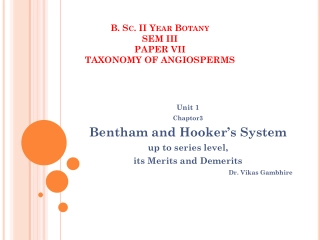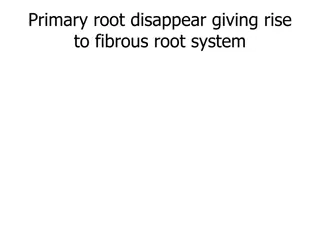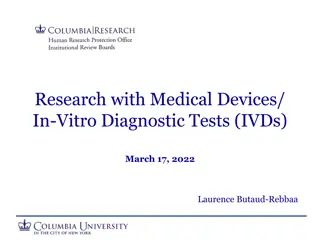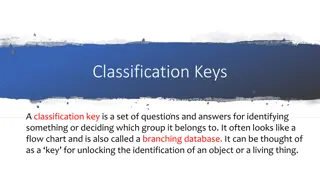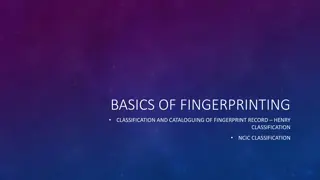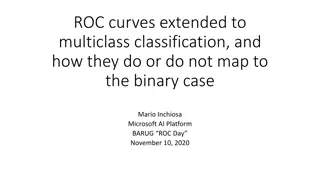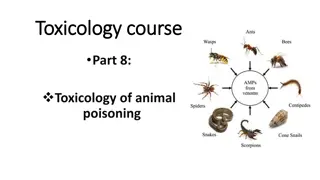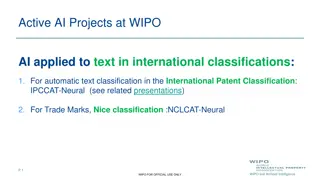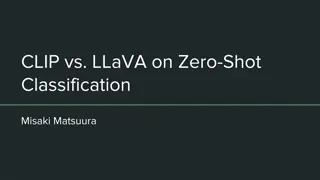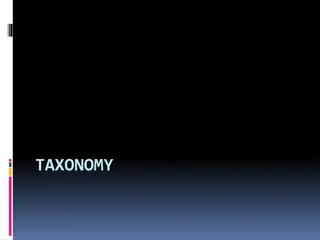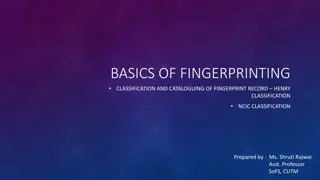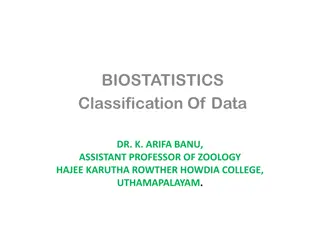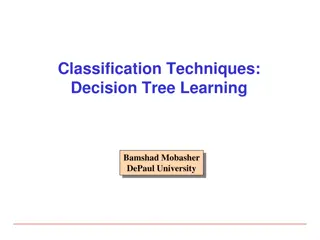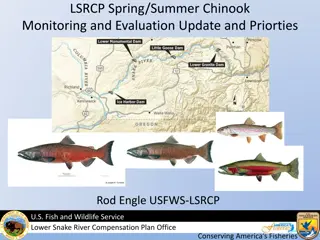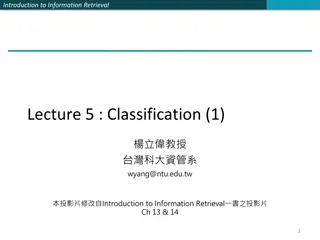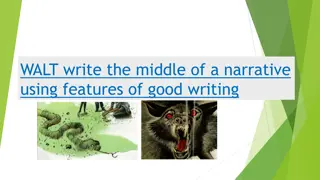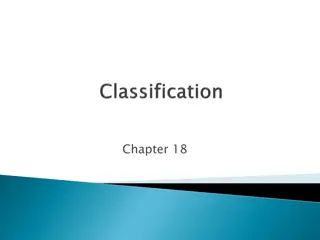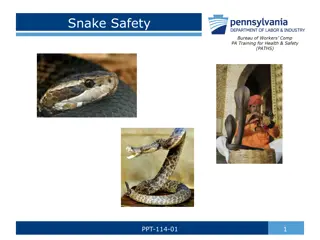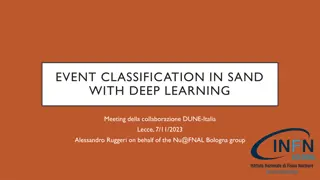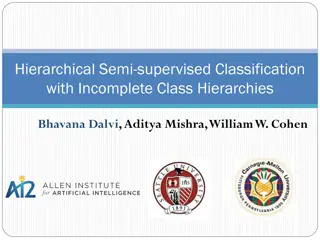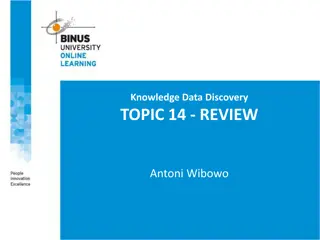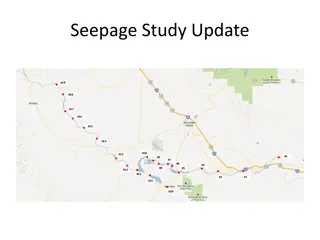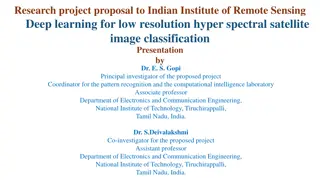Bentham and Hooker's System of Classification in Botany
Bentham and Hooker's system of classification in botany is a natural system based on a large number of characters considered simultaneously. Proposed by British taxonomists George Bentham and Joseph Dalton Hooker, this system categorizes seed plants into classes, orders, families, and genera. It is
2 views • 10 slides
Ship Classification and Design Factors Overview
Explore the categorization and classification of ships based on usage and support type. Delve into the factors influencing ship design such as size, speed, payload, range, seakeeping, maneuverability, stability, and special capabilities. Learn about the various methods of ship classification, includ
6 views • 104 slides
Understanding Tumor Classification and Nomenclature in Pathology
This slideshow provides an overview of tumor classification, nomenclature, and key concepts in pathology. It covers the definitions of neoplasm, tumor, and oncology, the classification of tumors into benign and malignant categories, as well as the importance of stroma in tumor behavior. It also expl
4 views • 61 slides
Plant Classification and Nomenclature Explained
Understanding plant classification through taxonomy, identification, and naming processes. Learn about the botanical structures such as roots, venation patterns, flowers, and vascular bundles. Explore the principles of binomial nomenclature, genus, and species differentiation. Discover the diverse s
2 views • 159 slides
Understanding FDA Regulations and Medical Device Classification
The Food and Drug Administration (FDA) plays a crucial role in regulating research, manufacturing, marketing, and distribution of medical devices. Medical devices are classified based on risk and intended use, with three main categories determining regulatory pathways. The classification system help
2 views • 27 slides
Understanding Migraine: Types, Classification, and Symptoms
Migraine is a complex neurological condition characterized by severe headaches often accompanied by other symptoms. The classification of migraines includes those with and without aura, chronic migraines, and childhood periodic syndromes. Complications and disorders associated with migraines are als
2 views • 46 slides
Understanding Classification Keys for Identifying and Sorting Things
A classification key is a tool with questions and answers, resembling a flow chart, to identify or categorize things. It helps in unlocking the identification of objects or living things. Explore examples like the Liquorice Allsorts Challenge and Minibeast Classification Key. Also, learn how to crea
1 views • 6 slides
Basics of Fingerprinting Classification and Cataloguing
Fingerprint classification is crucial in establishing a protocol for search, filing, and comparison purposes. It provides an orderly method to transition from general to specific details. Explore the Henry Classification system and the NCIC Classification, and understand why classification is pivota
5 views • 18 slides
Five Kingdom Classification in Biology: An Overview
The five kingdom system of classification, proposed by R.H. Whittaker in 1969, categorizes living organisms into Monera, Protista, Fungi, Plantae, and Animalia based on their characteristics. Each kingdom represents a distinct group of organisms, aiding in a more scientific and natural classificatio
2 views • 7 slides
Understanding ROC Curves in Multiclass Classification
ROC curves are extended to multiclass classification to evaluate the performance of models in scenarios such as binary, multiclass, and multilabel classifications. Different metrics such as True Positive Rate (TPR), False Positive Rate (FPR), macro, weighted, and micro averages are used to analyze t
3 views • 8 slides
Understanding Animal Venom and Snake Classification in Toxicology
Animal venom, particularly snake venom, contains various toxins that can have detrimental effects on the body. Different types of snake venom target specific systems, such as neurotoxic venom affecting neuromuscular junctions and hemotoxic venom impacting the cardiovascular system. Understanding the
4 views • 27 slides
Understanding Classification in Data Analysis
Classification is a key form of data analysis that involves building models to categorize data into specific classes. This process, which includes learning and prediction steps, is crucial for tasks like fraud detection, marketing, and medical diagnosis. Classification helps in making informed decis
2 views • 72 slides
AI Projects at WIPO: Text Classification Innovations
WIPO is applying artificial intelligence to enhance text classification in international patent and trademark systems. The projects involve automatic text categorization in the International Patent Classification and Nice classification for trademarks using neural networks. Challenges such as the av
2 views • 10 slides
Comparing CLIP vs. LLaVA on Zero-Shot Classification by Misaki Matsuura
In this study by Misaki Matsuura, the effectiveness of CLIP (contrastive language-image pre-training) and LLaVA (large language-and-vision assistant) on zero-shot classification is explored. CLIP, with 63 million parameters, retrieves textual labels based on internet image-text pairs. On the other h
0 views • 6 slides
Understanding Taxonomy and Scientific Classification
Explore the world of taxonomy and scientific classification, from the discipline of classifying organisms to assigning scientific names using binomial nomenclature. Learn the importance of italicizing scientific names, distinguish between species, and understand Linnaeus's system of classification.
0 views • 19 slides
Overview of Fingerprint Classification and Cataloguing Methods
Explore the basics of fingerprint classification, including Henry Classification and NCIC Classification systems. Learn about the importance of classification in establishing protocols for searching and comparison. Discover the components of Henry Classification, such as primary, secondary, sub-seco
1 views • 21 slides
Understanding BioStatistics: Classification of Data and Tabulation
BioStatistics involves the classification of data into groups based on common characteristics, allowing for analysis and inference. Classification organizes data into sequences, while tabulation systematically arranges data for easy comparison and analysis. This process helps simplify complex data,
0 views • 12 slides
Introduction to Decision Tree Classification Techniques
Decision tree learning is a fundamental classification method involving a 3-step process: model construction, evaluation, and use. This method uses a flow-chart-like tree structure to classify instances based on attribute tests and outcomes to determine class labels. Various classification methods,
5 views • 20 slides
Chinook Monitoring and Evaluation Update for Lower Snake River Compensation Plan Office
This update covers the monitoring and evaluation of Spring/Summer Chinook populations in the Lower Snake River, highlighting current performance, programmatic changes, and priorities for improvement. It also discusses the allocation of compensation for adult Chinook by state and the shifts in produc
0 views • 20 slides
slidesgo-925-silver-enchanting-snake-design-earrings-aus-385-20240909052730LPlh
Discover elegance with our 925 Sterling Silver Enchanting Snake Design Earrings, perfect for any girl seeking a unique touch. Crafted from high-quality sterling silver, these earrings feature a captivating snake design that adds a bold yet sophistica
0 views • 6 slides
slidesgo-925-silver-enchanting-snake-design-earrings-aus-385-20240909052730LPlh
Discover elegance with our 925 Sterling Silver Enchanting Snake Design Earrings, perfect for any girl seeking a unique touch. Crafted from high-quality sterling silver, these earrings feature a captivating snake design that adds a bold yet sophistica
0 views • 6 slides
Understanding Text Classification in Information Retrieval
This content delves into the concept of text classification in information retrieval, focusing on training classifiers to categorize documents into predefined classes. It discusses the formal definitions, training processes, application testing, topic classification, and provides examples of text cl
0 views • 57 slides
The Sneaky and Very Creepy King Cobra - Facts and Information
The King Cobra, scientifically known as Ophiophagus Hannah, is a reptile that resides in Southeast Asia. Known for its brown and tan-ish body with brown polka dots, it has an average length of 13.2 feet and can weigh between 12-17.6 pounds. This deadly snake preys on other snakes and lizards, utiliz
0 views • 6 slides
The Creation of the Mysterious Snake
Excitedly, Harry sets out to create a magnificent snake, drawing the attention of his friends. As he brings the creature to life, unexpected events unfold, leading to a divine intervention. The story highlights the power of imagination and the consequences of playing with forces beyond comprehension
0 views • 8 slides
Understanding Taxonomy and Classification in Biology
Scientists use classification to group organisms logically, making it easier to study life's diversity. Taxonomy assigns universally accepted names to organisms using binomial nomenclature. Carolus Linnaeus developed this system, organizing organisms into species, genus, family, order, class, phylum
0 views • 11 slides
Mineral and Energy Resources Classification and Valuation in National Accounts Balance Sheets
The presentation discusses the classification and valuation of mineral and energy resources in national accounts balance sheets, focusing on the alignment between the System of Environmental-Economic Accounting (SEEA) and the System of National Accounts (SNA) frameworks. It highlights the need for a
0 views • 17 slides
Developments in Establishing Quantitative Objectives for Salmon and Steelhead in the Columbia Basin
The Columbia Basin Partnership Task Force, led by NOAA, has been working on setting shared, quantitative objectives for salmon and steelhead in the Columbia Basin. The process involves creating prototype work teams to test and develop these objectives, with a focus on areas like the Snake River Basi
0 views • 47 slides
Snake Safety Awareness and Pennsylvania Snake Species Overview
Discover essential snake safety tips and interesting facts about snakes, including the diverse snake species found in Pennsylvania. Learn about venomous and nonvenomous snakes, distinguishing features, and how to stay safe around these fascinating reptiles.
0 views • 26 slides
Snake Bite Epidemiology and Mortality in India
Snake bites pose a significant public health challenge in India, with a high incidence of deaths especially in rural regions. Lack of reliable national data hinders accurate assessment of the problem. The major venomous snakes contributing to fatalities include species from the families Elapidae and
0 views • 32 slides
Snake Bite Management Guidelines: Reassurance, Immobilization, Hospital Care
Snake bite management involves reassuring the victim, immobilizing the affected limb, and promptly transporting the individual to a hospital with snakebite treatment facilities. Local and systemic examinations are essential to assess the severity of envenomation, followed by necessary investigations
0 views • 12 slides
Event Classification in Sand with Deep Learning: DUNE-Italia Collaboration
Alessandro Ruggeri presents the collaboration between DUNE-Italia and Nu@FNAL Bologna group on event classification in sand using deep learning. The project involves applying machine learning to digitized STT data for event classification, with a focus on CNNs and processing workflows to extract pri
0 views • 11 slides
Hierarchical Semi-Supervised Classification with Incomplete Class Hierarchies
This research explores the challenges and solutions in semi-supervised entity classification within incomplete class hierarchies. It addresses issues related to food, animals, vegetables, mammals, reptiles, and fruits, presenting an optimized divide-and-conquer strategy. The goal is to achieve semi-
0 views • 18 slides
Understanding Classification in Data Mining
Classification in data mining involves assigning objects to predefined classes based on a training dataset with known class memberships. It is a supervised learning task where a model is learned to map attribute sets to class labels for accurate classification of unseen data. The process involves tr
0 views • 26 slides
Pharaoh's Snake Experiment Procedure and Video Links
This content provides a detailed overview of the Pharaoh's Snake experiment conducted by Karin Grdadolnik and Sara Ferko from Gimnazija Moste. It includes images of the experiment setup, reagents, and procedure. The experiment involved measuring chemicals, using sand, sugar, baking soda, ethanol, an
0 views • 5 slides
Exploring Snake River Waters: A Visual Journey
Embark on a visual adventure through images showcasing the beauty of Snake River and CJ Strike Reservoir. Witness the serene seepage study updates, captivating views of CJ Strike Reservoir with its white caps, and the picturesque landscapes of Snake River near Murphy and Bliss. Let these stunning im
0 views • 6 slides
Overview of Hutchinson and Takhtajan's Plant Classification System
Hutchinson and Takhtajan, as presented by Dr. R. P. Patil, Professor & Head of the Department of Botany at Deogiri College, Aurangabad, have contributed significantly to the field of plant classification. John Hutchinson, a renowned British botanist, introduced a classification system based on princ
0 views • 20 slides
Understanding the EPA's Ozone Advance Program and Clean Air Act
The content covers key information about the EPA's Ozone Advance Program, including the basics of ozone, the Clean Air Act requirements, designation vs. classification, classification deadlines, and marginal classification requirements. It explains the formation of ozone, the importance of reducing
0 views • 40 slides
Snake Video Game Project Proposal by Gani Kumisbek
Proposal by Gani Kumisbek for a Snake video game project, including a basic demonstration of the idea, utilization of a BRAM Microblaze CPU via AXI BUS VGA controller and Button controller, specifications such as screen resolution and refresh rate, a project timeline with key milestones, and a game
0 views • 6 slides
Deep Learning for Low-Resolution Hyperspectral Satellite Image Classification
Dr. E. S. Gopi and Dr. S. Deivalakshmi propose a project at the Indian Institute of Remote Sensing to use Generative Adversarial Networks (GAN) for converting low-resolution hyperspectral images into high-resolution ones and developing a classifier for pixel-wise classification. The aim is to achiev
0 views • 25 slides
Robust High-Dimensional Classification Approaches for Limited Data Challenges
In the realm of high-dimensional classification with scarce positive examples, challenges like imbalanced data distribution and limited data availability can hinder traditional classification methods. This study explores innovative strategies such as robust covariances and smoothed kernel distributi
0 views • 10 slides
